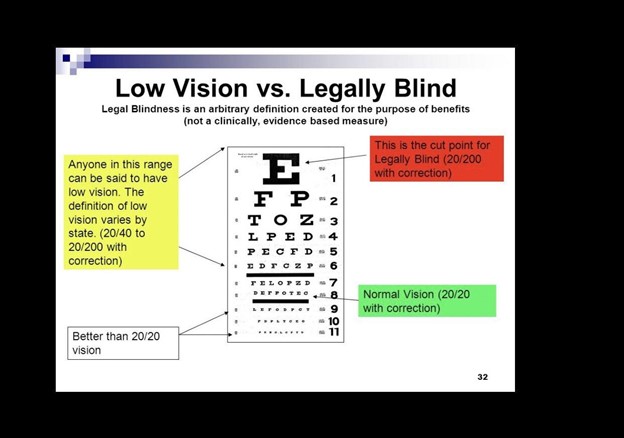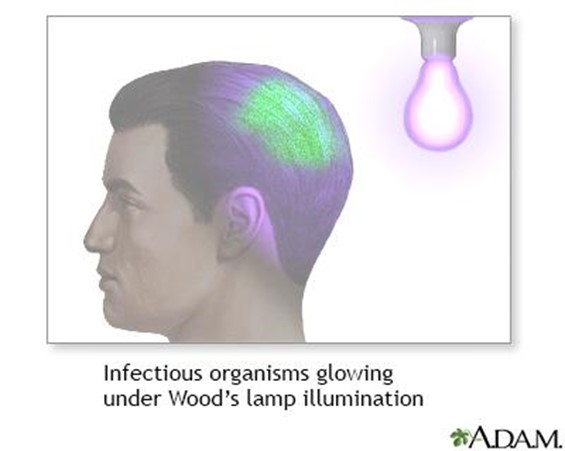A client's chart indicates that they are legally blind. Which of the following is the definition of legally blind?
Full vision loss in at least one eye
The best-corrected vision in the better eye of 20/200 or less
Inability to see clearly from 200 feet away without corrective lenses
Bilateral visual impairment of 20/60 or greater
The Correct Answer is B
Choice A Reason: This is incorrect because full vision loss in one eye does not necessarily mean that the person is legally blind. Legal blindness depends on the visual acuity and visual field of both eyes.
Choice B Reason: This is correct because legal blindness is defined by the World Health Organization (WHO) as having a visual acuity of 20/200 or worse in the better eye with the best possible correction, such as glasses or contact lenses. This means that the person can see at 20 feet what a normal person can see at 200 feet.
Choice C Reason: This is incorrect because inability to see clearly from 200 feet away without corrective lenses may indicate nearsightedness or myopia, but not legal blindness. Nearsightedness can be corrected with lenses or surgery.
Choice D Reason: This is incorrect because bilateral visual impairment of 20/60 or greater does not meet the criteria for legal blindness. Visual impairment is defined by WHO as having a visual acuity of less than 20/60 but better than 20/200 in the better eye with the best possible correction.

Nursing Test Bank
Naxlex Comprehensive Predictor Exams
Related Questions
Correct Answer is D
Explanation
Choice A Reason: Culture is not a diagnostic test that uses an ultraviolet light source, but a laboratory test that involves growing microorganisms from a sample of body fluid or tissue. Culture can help identify the type and sensitivity of the infection-causing agent.
Choice B Reason: KOH is not a diagnostic test that uses an ultraviolet light source, but a chemical test that involves applying potassium hydroxide to a sample of skin, hair, or nail. KOH can help diagnose fungal infections by dissolving the keratin and revealing the fungal elements under a microscope.
Choice C Reason: Diascopy is not a diagnostic test that uses an ultraviolet light source, but a physical test that involves applying pressure to a lesion with a glass slide or lens. Diascopy can help differentiate between blanchable and non-blanchable lesions, such as erythema or petechiae.
Choice D Reason: Wood's is a diagnostic test that uses an ultraviolet light source, also known as a Wood's lamp or black light. Wood's can help observe color changes to the skin that are not visible under normal light, such as fluorescence or hypopigmentation. Wood's can help diagnose conditions such as tinea capitis, vitiligo, or erythrasma.

Correct Answer is ["B","E","F"]
Explanation
Choice A Reason: Edema is not a specific finding of a systemic infection, but rather a possible sign of fluid overload or impaired venous return. It can occur due to excessive infusion rate, heart failure, or obstruction of blood flow in or around the central line.
Choice B Reason: This is a correct choice. Purulent drainage at intravenous insertion site is a finding of a local infection that can spread systemically. It indicates bacterial invasion and inflammation of the skin and subcutaneous tissue around the catheter.
Choice C Reason: Redness at insertion site is a finding of a local infection that can spread systemically. It indicates increased blood flow and inflammation of the skin and subcutaneous tissue around the catheter.
Choice D Reason: Nausea is not a specific finding of a systemic infection, but rather a possible side effect of parenteral nutrition or a symptom of another condition. It can occur due to electrolyte imbalance, hyperglycemia, or gastrointestinal disorders.
Choice E Reason: This is a correct choice. Leukocytosis is a finding of a systemic infection that indicates increased production and release of white blood cells in response to infection. It can be detected by a blood test.
Choice F Reason: This is a correct choice. Fever is a finding of a systemic infection that indicates increased body temperature due to activation of the immune system and release of pyrogens. It can be measured by a thermometer.
Whether you are a student looking to ace your exams or a practicing nurse seeking to enhance your expertise , our nursing education contents will empower you with the confidence and competence to make a difference in the lives of patients and become a respected leader in the healthcare field.
Visit Naxlex, invest in your future and unlock endless possibilities with our unparalleled nursing education contents today
Report Wrong Answer on the Current Question
Do you disagree with the answer? If yes, what is your expected answer? Explain.
Kindly be descriptive with the issue you are facing.
